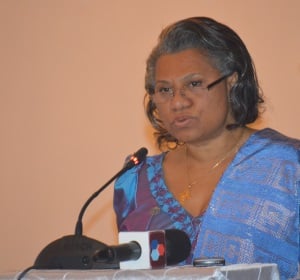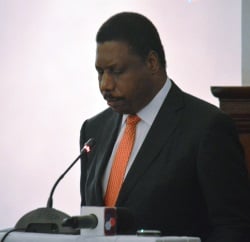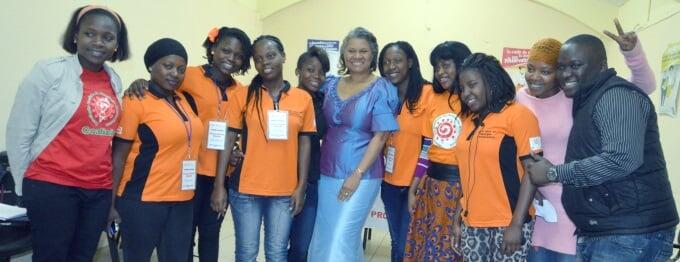MAPUTO, Mozambique – UNFPA will continue to work with its Mozambican partners to ensure that the agenda of the International Conference on Population and Development (ICPD) remains at the centre of development efforts, said Dr. Julitta Onabanjo, UNFPA Regional Director for East and Southern Africa.

“UNFPA remains committed to working with you to ensure that this unfinished business of the ICPD remains at the core of the post-2015 development agenda – an agenda that speaks in a powerful way to reducing poverty, to protecting our environment and to building a more just, peaceful and stable Africa,” she said.
Dr. Onabanjo made this commitment at the Conference on Population Dynamics and Socio-Economic Development in Mozambique, held in Maputo, as part of the celebration of World Population Day (11 July).
The conference was organized by the Ministry of Planning and Development with the support of UNFPA. It was attended by national experts in population and development, and delegations from South Africa and Burundi, who shared their experiences.
Sensitize decision-makers
The conference coincided with the review of the population policy in Mozambique as well as the current revision of the ICPD agenda across the world.
The event was aimed at sensitizing decision-makers , policy makers and other development actors to take into account the elements of population dynamics – such as fertility, migration and mortality – in the planning and development process, said Mozambique’s Minister of Health Dr. Alexandre Manguele.

Understanding population dynamics is becoming increasingly important, as the world population now exceeds seven billion people, he said. In the case of Mozambique, the youthful population structure poses a challenge to the Government in the provision of education and health services, as well as employment and entrepreneurship opportunities.
Dr. Onabanjo said Mozambique and other African countries are struggling to balance risingeconomic growth with population growth. The conference provided an opportunity to discuss and exchange experiences to overcome the challenges, she said.
“It’s important to discuss how we can better integrate population variables and dynamics into our planning processes, so that as we look at trends in population in the region we can ensure that our poverty reduction strategies incorporate that information, and then we can plan in advance,” she said.
Youth in the spotlight
Due to its youthful population structure, Mozambique is working hard to ensure that the potential of young people is reached in order to generate a workforce that can contribute fully to national development, Dr. Manguele said.
But for that to happen, it is important to ensure that they are well educated, Dr. Onabanjo responded. "It is fundamental to ensure that young people have access to information and services that can protect them from teenage pregnancies, which continue to be the biggest cause of maternal deaths in that age group.”
She called on governments to invest also in comprehensive sexuality education for young people, so that they can make choices and when they need services, access them. “Let’s continue to build on the foundation of human rights and the principle of voluntary, informed free choice, which guide the international population agenda,” she said.
Dr. Onabanjo held discussions with representatives of government departments, including the Ministries of Health and Planning and Development, as well as the National Institute of Statistics, AMODEFA (Mozambique’s family planning association), Associação Coalizão da Juventude Moçambicana (a network of youth associations) and young artists working with UNFPA.





